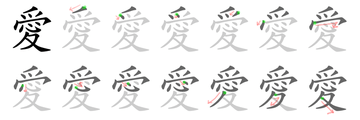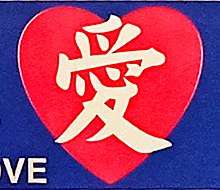愛
| ||||||||
Translingual
| Stroke order | |||
|---|---|---|---|
 | |||
Han character
愛 (radical 61, 心+9, 13 strokes, cangjie input 月月心水 (BBPE), four-corner 20247, composition ⿳爫冖𢖻)
Derived characters
Related characters
Descendants
- 𛀃 (Hentaigana)
References
- KangXi: page 395, character 13
- Dai Kanwa Jiten: character 10947
- Dae Jaweon: page 732, character 2
- Hanyu Da Zidian: volume 4, page 2323, character 1
- Unihan data for U+611B
Chinese
| trad. | 愛 | |
|---|---|---|
| simp. | 爱 | |
| variant forms | ||
Glyph origin
| Historical forms of the character 愛 | |
|---|---|
| Warring States | Shuowen Jiezi (compiled in Han) |
| Bronze inscriptions | Small seal script |
 |
 |
| Characters in the same phonetic series (愛) (Zhengzhang, 2003) | |
|---|---|
| Old Chinese | |
| 愛 | *qɯːds |
| 曖 | *qɯːds, *qaːds |
| 僾 | *qɯːds, *qɯlʔ |
| 靉 | *qɯːds, *qɯlʔ |
| 薆 | *qɯːds |
| 璦 | *qɯːds |
| 瞹 | *qaːds |
Originally 㤅, a phono-semantic compound (形聲, OC *qɯːds) : phonetic 旡 (OC *kɯds) + semantic 心 (“heart”).
As early as the Qin dynasty, a meaningless component 夊 (“foot”) was added to the bottom of the character, as with some other characters depicting people. Compare 憂 (from 㥑).
Further corruption turned the original phonetic 旡 into ⿱爫冖.
Etymology
From Proto-Sino-Tibetan *ŋ-(w)aːj (“to copulate; to love; to be gentle”) (STEDT). Compare Proto-Karen *ʔai (“to love”), whence Pa'o Karen [script needed] (ʔái, “to love”), S'gaw Karen အဲၣ် ('ɛ̀, “to love”); Southern Bai e⁴⁴ (“love”); Mizo hma-ngaih (“to love, to like”); Jingpho nwai (“to respect, to love”), ngwi (“to be gentle”); Burmese [script needed] (ŋwé, “to be gentle, moderate”). The Chinese word is related to a Tibeto-Burman allofam without initial *ŋ-.
Pronunciation
Definitions

愛
- to love
- to treasure; to value
- to like; to be fond of; to be keen on
- to be prone; to be easy to
- love; affection
- love; benevolence
- 遺愛人間 / 遗爱人间 ― yíàirénjiān ― to leave love behind
- something one loves; someone whom one loves
- Honorific for someone else's daughter; variant of 嬡/嫒 (ài).
- affectionate
- beloved
- (Hakka, Cantonese, Wu) to want (an object)
- (Min, Hakka) to want to do; to need to; must
- A surname.
Synonyms
| Dialectal synonyms of 喜歡 (“to like”) [map] | ||
|---|---|---|
| Variety | Location | Words |
| Classical Chinese | 好, 喜好, 愛好 | |
| Formal (Written Standard Chinese) | 喜愛, 喜好, 愛好 | |
| Mandarin | Beijing | 喜歡, 好希, 愛 |
| Taiwan | 喜歡, 愛 | |
| Jinan | 喜歡 | |
| Xi'an | 喜歡, 愛 | |
| Wuhan | 喜歡, 愛 | |
| Chengdu | 喜歡, 歡喜, 愛 | |
| Yangzhou | 歡喜 | |
| Hefei | 喜歡 | |
| Cantonese | Guangzhou | 中意, 歡喜 |
| Hong Kong | 中意 | |
| Taishan | 中意 | |
| Yangjiang | 中意, 歡喜 | |
| Gan | Nanchang | 歡喜 |
| Hakka | Meixian | 中意, 好 |
| Miaoli (N. Sixian) | 中意, 好 | |
| Liudui (S. Sixian) | 中意, 好 | |
| Hsinchu (Hailu) | 中意, 好 | |
| Dongshi (Dabu) | 中意, 合意, 好 | |
| Hsinchu (Raoping) | 中意, 好 | |
| Yunlin (Zhao'an) | 佮意, 愛 | |
| Sabah | 中意, 惜 | |
| Jin | Taiyuan | 喜歡, 待見 |
| Min Bei | Jian'ou | 愛, 喜歡 |
| Min Dong | Fuzhou | 歡喜, 中意, 愛 |
| Min Nan | Xiamen | 歡喜, 意愛, 愛, 佮意, 舒合 |
| Quanzhou | 歡喜, 意愛, 愛, 佮意 | |
| Zhangzhou | 歡喜, 愛, 佮意 | |
| Taipei | 歡喜, 意愛, 愛, 佮意 | |
| Penang | 舒合, 愛 | |
| Philippines (Manila) | 愛, 佮意 | |
| Chaozhou | 歡喜, 愛 | |
| Wu | Shanghai | 歡喜 |
| Suzhou | 歡喜 | |
| Wenzhou | 喜歡 | |
| Xiang | Changsha | 喜歡 |
| Shuangfeng | 喜歡 | |
Usage notes
- When used for people, 愛/爱 usually refers to romantic love. When used like this, older Mandarin speakers often describe the use of this term as overly 肉麻 (ròumá, “cheesy”). For this reason, the word 喜歡/喜欢 (xǐhuan, “to like”) might be used instead. Using the word 喜歡/喜欢 (xǐhuan) literally means like, but when used in a romantic context (especially boyfriend/girlfriend), it actually means love. However, younger Mandarin speakers seem to have been influenced somewhat by Western culture, and are now using the verb 愛/爱 much more often than was socially acceptable in the past.
Compounds
|
|
|
Further reading
- “Entry #9456”, in 臺灣閩南語常用詞辭典 [Dictionary of Frequently-Used Taiwan Minnan] (in Chinese and Min Nan), Ministry of Education, R.O.C., 2011.
Japanese
Readings
Compounds
- 愛玩 (aigan)
- 愛機 (aiki)
- 愛敬 (aikyō)
- 愛顧 (aiko)
- 愛護 (aigo)
- 愛国 (aikoku)
- 愛妻 (aisai, “one's beloved wife”)
- 愛児 (aiji)
- 愛車 (aisha, “one's beloved car”)
- 愛社 (aisha)
- 愛唱 (aishō)
- 愛称 (aishō)
- 愛人 (aijin)
- 愛想 (aisō)
- 愛憎 (aizō)
- 愛着 (aichaku, “affection (to things)”)
- 愛鳥 (aichō)
- 愛読 (aidoku, “loving to read”)
- 愛用 (aiyō, “loving to use”)
- 性愛 (seiai, “eros”)
- 聖愛 (seiai, “pure love”)
- 寵愛 (chōai)
- 可愛い (kawaii)
Noun
- love
- 愛は強く。
- Ai wa tsuyoku.
- The love is strong.
- 愛は強く。
- affection
- Synonym: 愛情 (aijō)
- tenderness
- This term needs a translation to English. Please help out and add a translation, then remove the text
{{rfdef}}.- Synonym: 愛想 (aiso)
- (Buddhism) This term needs a translation to English. Please help out and add a translation, then remove the text
{{rfdef}}. - (Christianity) agape
Synonyms
- (love, generally more passionate or erotic): 恋 (koi), 恋愛 (ren'ai)
Derived terms
Etymology 2
| Kanji in this term |
|---|
| 愛 |
| まな Grade: 4 |
| kun’yomi |
Originally a compound of 真 (ma, “true, genuine”) + な (na), an Old Japanese version of modern Japanese の (no, possessive particle).[3]
The use of 愛 here is an example of ateji (当て字).
Alternative forms
Prefix
愛 (hiragana まな, rōmaji mana-)
- before a common noun, expresses a sense of admiration or value: good, genuine; compare English the real deal
- before a noun describing a person, expresses praise or fondness: dear, beloved
Etymology 3
Used as ateji in various names. 愛 is a very common element in many, many names.
Proper noun
愛 (hiragana あづみ, rōmaji Azumi, alternative reading ああい, rōmaji Āi, alternative reading あいか, rōmaji Aika, alternative reading あいす, rōmaji Aisu, alternative reading あき, rōmaji Aki, alternative reading あこ, rōmaji Ako, alternative reading あみか, rōmaji Amika, alternative reading あおい, rōmaji Aoi, alternative reading ありさ, rōmaji Arisa, alternative reading あや, rōmaji Aya, alternative reading あゆ, rōmaji Ayu, alternative reading ちぎり, rōmaji Chigiri, alternative reading ちか, rōmaji Chika, alternative reading ちかし, rōmaji Chikashi, alternative reading えりな, rōmaji Erina, alternative reading はあと, rōmaji Hāto, alternative reading ひかり, rōmaji Hikari, alternative reading いと, rōmaji Ito, alternative reading いとし, rōmaji Itoshi, alternative reading いつみ, rōmaji Itsumi, alternative reading いずみ, rōmaji Izumi, alternative reading かな, rōmaji Kana, alternative reading かなえ, rōmaji Kanae, alternative reading かなさ, rōmaji Kanasa, alternative reading きずな, rōmaji Kizuna, alternative reading こころ, rōmaji Kokoro, alternative reading このむ, rōmaji Konomu, alternative reading まどか, rōmaji Madoka, alternative reading まなぶ, rōmaji Manabu, alternative reading まなみ, rōmaji Manami, alternative reading めづる, rōmaji Mezuru, alternative reading めご, rōmaji Mego, alternative reading めぐ, rōmaji Megu, alternative reading めぐみ, rōmaji Megumi, alternative reading めぐむ, rōmaji Megumu, alternative reading めい, rōmaji Mei, alternative reading なる, rōmaji Naru, alternative reading なるこ, rōmaji Naruko, alternative reading のぞみ, rōmaji Nozomi, alternative reading らぶ, rōmaji Rabu, alternative reading るい, rōmaji Rui, alternative reading さら, rōmaji Sara, alternative reading さらん, rōmaji Saran, alternative reading つぐみ, rōmaji Tsugumi, alternative reading つくみ, rōmaji Tsukumi, alternative reading うい, rōmaji Ui, alternative reading よし, rōmaji Yoshi, alternative reading よしき, rōmaji Yoshiki, alternative reading よしみ, rōmaji Yoshimi)
- a female given name
References
Korean
Compounds
- 가애 (可愛, gaae)
- 경애 (敬愛, gyeong-ae)
- 동성애 (同性愛, dongseong-ae)
- 무성애 (無性愛, museong-ae)
- 애견 (愛犬, aegyeon)
- 애고 (愛顧, aego)
- 애교 (愛嬌, aegyo)
- 애국 (愛國, aeguk)
- 애독 (愛讀, aedok)
- 애마 (愛馬, aema)
- 애무 (愛撫, aemu)
- 애식 (愛息, aesik)
- 애완동물 (愛玩動物, aewandongmul)
- 애인 (愛人, aein)
- 애장판 (愛藏版, aejangpan)
- 애정 (愛情, aejeong)
- 애증 (愛憎, aejeung)
- 애차 (愛車, aecha)
- 애착 (愛着, aechak)
- 애처 (愛妻, aecheo)
- 애칭 (愛稱, aeching)
- 애호 (愛好, aeho)
- 애호 (愛護, aeho)
- 이성애 (異性愛, iseong-ae)
- 자기애 (自己愛, jagiae)
- 친애 (親愛, chinae)
- 할애 (割愛, harae)
Old Japanese
Alternative forms
Etymology
Originally a compound of 眞 (ma, “true, genuine”) + な (na, apophonic form of possessive particle の (no2)).
Noun
愛 (mana) (kana まな)
Vietnamese
Han character
愛: Hán Việt readings: ái[1][2][3][4][5], áy[4]
愛: Nôm readings: ái[1][2][3][4][5][6], áy[1][2][3][4][5][6], ải[1]
References
- Nguyễn (2014).
- Nguyễn et al. (2009).
- Trần (2004).
- Bonet (1899).
- Génibrel (1898).
- Taberd & Pigneau de Béhaine (1838).